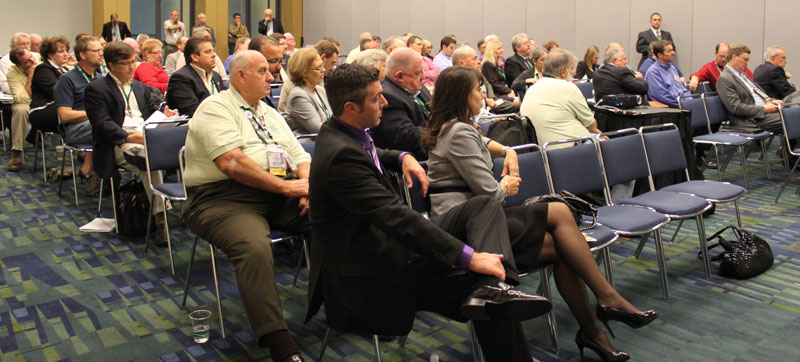This year's Government Relations Forum at the Code Council's 2010 Annual Conference included an update from the U.S. Department of Energy on activities related to the International Energy Conservation Code; a presentation and discussion on the International Green Construction Code/189.1/Leadership in Energy and Environmental Design (LEED); a presentation on the Code Council's Wildland Urban Interface program; and reports on other Council federal, state and local activities.
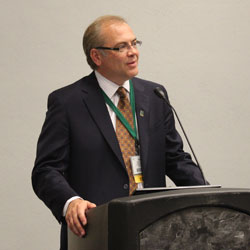 |
|
Code Council CEO Rick Weiland opens the Government Relations Forum and briefs attendees on several important Council initiatives. |
|
Code Council CEO Rick Weiland stopped by to open the Forum, greet attendees, welcome guest speakers David Conover of the Pacific Northwest National Laboratory (PNNL)—a U.S. Department of Energy (DOE) government research laboratory—and Jeremy Sigmon of the U.S. Green Building Council, and brief attendees on several important Council initiatives, including a new ICC award. The Public Official of the Year/CEO Award will recognize a public official who has shown career commitment to building code adoption and enforcement by consistently working on adoption of the latest codes and improved code administration. It will go to an individual who speaks publicly about the importance of codes, and who is actively involved with the Code Council. The first award will be presented during Building Safety Month 2011.
Weiland spoke on the Code Council's important legislative work carried out through its Government Relations (GR) department, and its aim to provide excellent customer service via GR representatives in assisting ICC Chapters, stakeholders and all members with state and local code adoptions. "ICC's government relations work in Washington, D.C., raises the visibility of ICC and its members at the Federal level, and that recognition raises the importance of the International Codes and the role that code officials play in providing a safer and better built environment," Weiland said.
Weiland thanked members for their support and help in getting the newest International Code adopted—the International Green Construction Code (IGCC)—in Rhode Island and in Richland, Washington. Rhode Island is the first state to adopt the IGCC and Richland is the first local government to adopt the IGCC.
Weiland concluded by welcoming Paul Brooks, Executive Director of the Center for Public Safety Excellence (CPSE), and Chuck Ramani, President of the International Accreditation Service (IAS), who were there to sign a formal agreement recognizing their commitment to develop the IAS Fire Prevention and Life Safety Department Accreditation Program. "This new accreditation program will formally recognize the fire prevention and life safety departments that have demonstrated technical competence to administer an effective system of code enforcement, fire prevention and life safety," said Weiland.
This new accreditation program will formally recognize the fire prevention and life safety departments that have demonstrated technical competence to administer an effective system of code enforcement, fire prevention and life safety. The accreditation program, which includes onsite review by an IAS assessment team, will evaluate departments against the performance requirements in ten primary categories, including governance and administration, risk assessment, goals and objectives, finance, program activity, physical resources, human resources, training and competency, essential resources, and external systems relations.
"Fire prevention offices—especially those that are independent, which in almost every scenario at state and county levels are independent organizations with minimal resources allocated to a small platform to tell their story from and to influence the safety of citizens in their community—their influence is so vital and important," said Brooks. "We partnered with IAS because of the experience that you have in accrediting building code departments and building inspection departments. It is a great partnership that's going to create that platform to allow our fire marshals, fire prevention officers, and life safety officers across the country and internationally to better tell their story. I appreciate this opportunity to develop these relationships and help us bring these projects to fruition."
The accreditation program is currently in the alpha testing stage, with the first fire and life safety department going through the evaluation process. The draft accreditation criteria used to evaluate departments has been developed with input from the fire community, stakeholders, and the IAS Technical Advisory Council. Final approval of the draft criteria by the IAS Accreditation Committee is expected in late 2010. IAS is accepting applications for accreditation under the draft criteria and will work with applicants as the criteria evolve or further changes are proposed. The CPSE is developing training materials and will be conducting workshops for departments interested in learning about the criteria for becoming accredited.
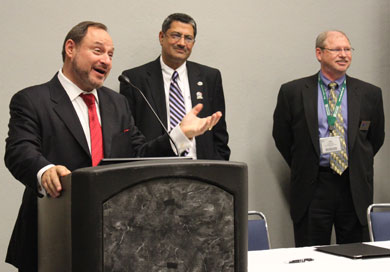 |
|
Code Council Board Immediate Past President Ron Lynn (left) says a few words about IAS and the CPSE before the signing. |
|
| |
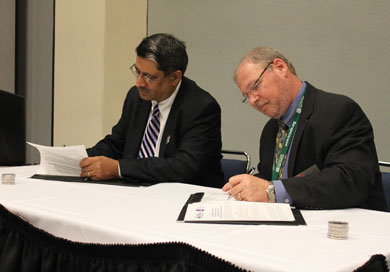 |
| |
IAS President Chuck Ramani (left) and CPSE Executive Director Paul Brooks (right) signing the Memorandum of Understanding. |
Government Relations Senior Vice President Sara Yerkes introduced the Council's GR staff, welcomed the guest speakers and gave an overview of their presentations, and spoke on some of the critical objectives of the organization. "The International Code Council has changed radically since the preconsolidation," said Yerkes. "We are now an international organization, our national model codes are now at the top of the nation, we have the attention of the federal government and our approaches have changed somewhat. we're no longer dealing with regions or regional organizations; our challenges are bigger now. This is an organization that has grown. Our codes are recognized and referenced in federal legislation, we frequently work with the federal government and we're building a very important presence in Washington, D.C. This is critical and important to you as state and local memebrs because it is our intent to protect the organization as a whole and also to look after the interests of our members. One of our objectives is to advance the mission and work of the ICC as a public safety organziation, as a model code developer, and to protect the interests of our members. We spend a lot of time educating legislators and legislative officials on how the model codes are developed and making sure that the process is respected and that recognition is given."
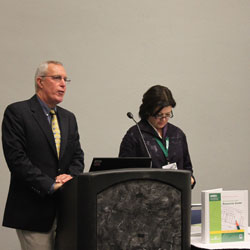 |
|
David Conover of the Pacific Northwest National Laboratory opened the presentations with his "Update on Energy Code Resources for State and Local Government". |
|
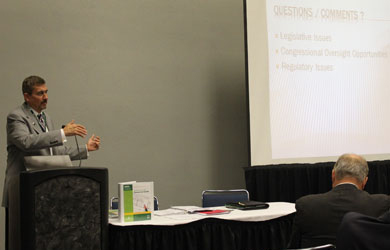 |
|
Code Council Federal/National Activities Vice President David Karmol presents on Code Council legislation, rulemaking and future initiatives. |
|
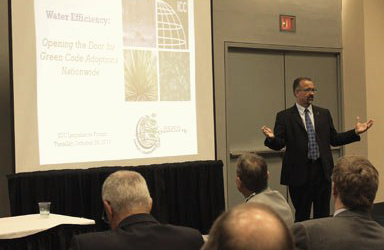 |
|
Jay Peters (standing, right), Code Council Plumbing, Mechanical and Fuel Gas Group Executive Director, presents on "Water Efficiency—Opening the Door for Green Code Adoptions Nationwide" |
|
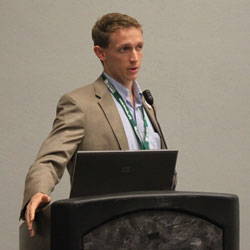 |
|
Special Guest Jeremy Sigmon of the U.S. Green Building Council gave an overview of LEED and how the USGBC has worked to make it a reguatory and engagement tool. |
|
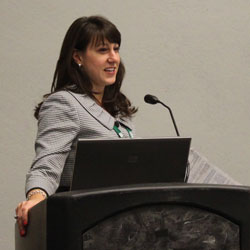 |
|
Dorothy Harris, State and Local Government Relations Vice President, presents on IGCC adoptions and advocacy. |
|
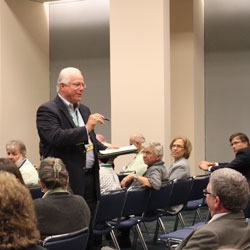 |
|
Vaughn Wicker, State Government Relations Vice President, updates attendees on state and local issues.
|
|
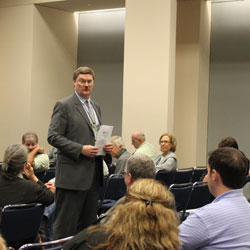 |
|
Bruce Johnson, ICC Director of Fire Service Activities, updates guests on fire service activities and issues.
|
|
|


